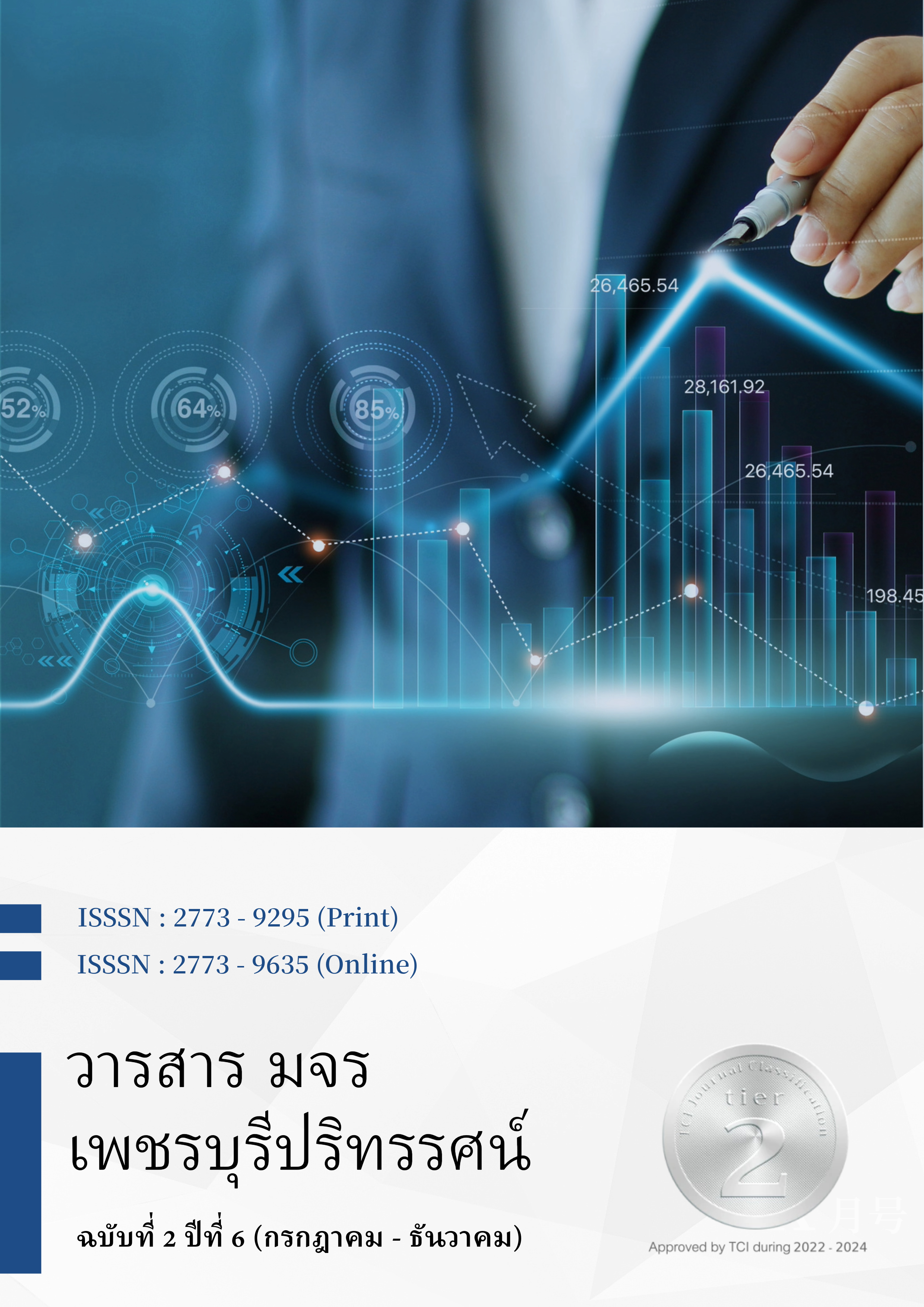FACTORS AFFECTING THE DECISION TO ENGAGE IN PRIVATE BUSINESS OF PRIVATE COMPANIES'EMPLOYEES
Main Article Content
Abstract
The objectives of this research were 1) to study motivation factors affecting the personal business decisions. 2) To compare private business engagement decisions to the characteristics of private company employees. 3) to study the motivational factors affecting the engagement decisions of private company employees. The sample consisted of 385 private company employees. The instrument used for data collection was a questionnaire. Statistics used in data analysis were mean, standard deviation, t-test, one-way ANOVA, and multiple regression analysis.The results showed that: 1) Motivating factors, in general, had the highest average level. Private company employees' personal business engagement decisions were found to be at the highest average level. 2) Employees of private companies with different genders, ages, education levels, marital status, and average monthly income made a significant difference in their decision to run their own business with a 0.05 level of significance. 3) 3 motivation factors affecting the decision to run their own business: the demanding aspect, value aspect, motivation aspect, all of which 3 variables could explain the variation in self-employment decision-making of employees of private companies at 37.90%.
Article Details

This work is licensed under a Creative Commons Attribution-NonCommercial-NoDerivatives 4.0 International License.
References
กองวิจัยตลาดแรงงาน. (2557). แนวโน้นอาชีพอิสระในอนาคต 3 ปีข้างหน้า. กองวิจัยตลาดแรงงาน และ กองส่งเสริมการมีงานทำ กรมการจัดหางาน กระทรวงแรงงาน.
กัลยา วาณิชย์บัญชา. (2560). สถิติสำหรับงานวิจัย. พิมพ์ครั้งที่ 11, โรงพิมพ์จุฬาลงกรณ์ มหาวิทยาลัย.
ชลลดา เจียมจิตวานิชย์ จิรพล จิยะจันทน์ และ นพดล พันธุ์พานิช. (2562). ตัวแบบการ เป็น
ผู้ประกอบการใหม่ของนักศึกษาปริญญาตรีสังกัดมหาวิทยาลัย ในเขต กรุงเทพมหานครและ ปริมณฑล . บัณฑิตวิทยาลัย มหาวิทยาลัยเวสเทิร์น.
ทวีศักดิ์ ฉิมแก้ว และแก้วตา ผู้พัฒนพงศ์. (2562) . ปัจจัยจูงใจที่มีผลต่อกระบวนการ ตัดสินใจเลือก ประกอบอาชีพของนักศึกษาระดับปริญญาตรี มหาวิทยาลัยรามคำแหง. มหาวิทยาลัย รามคำแหง.
ธาริณี อังค์ยศ (2563) เรื่อง ปัจจัยที่มีอิทธิพลต่อความปรารถนาในการเลือกอาชีพของนักศึกษา ระดับปริญญาตรีจังหวัดนครราชสีมา. การประชุมวิชาการระดับชาติครั้งที่ 7 วิทยาลัยนครราชสีมา.
ธีรยุทธ แก้วเกร็ด. (2561). การตัดสินใจเลือกอาชีพของพนักงานองค์กรเอกชน ในจังหวัดนครปฐม . มหาวิทยาลัยกรุงเทพ.
น้ำทิพย์ บุตรทศ. (2558). การตัดสินใจเลือกอาชีพ แรงจูงใจ และความก้าวหน้า. มหาวิทยาลัยบูรพา.
ภาคภูมิ สิงห์แก้ว. (2560). ปัจจัยที่มีผลต่อการตัดสินใจเลือกประกอบอาชีพของประชาชนในชุมชน แผ่นดินธรรม-แผ่นดินทอง ตำบลตะพานหิน อำเภอตะพานหิน จังหวัดพิจิตร. มหาวิทยาลัย พิบูลสงคราม.
ศวรรณยา คล้ายเชย. (2563). แรงจูงใจที่มีอิทธิพลในการเป็นเจ้าของธุรกิจ Café ในจังหวัด นครปฐม. วารสารโครงการทวิปริญญาทางรัฐประศาสนศาสตร์และบริหารธุรกิจ มหาวิทยาลัยรามคำแหง.
สำนักงานเลขาธิการสภาการศึกษา. (2561). การจัดการศึกษาเพื่อพัฒนาความเป็น ผู้ ประกอบการ.(รายงานวิจัย). กรุงเทพฯ: บริษัท พริกหวานกราฟฟิค จํากัด.
อุไรพร ช่างบรรจง. (2556). มูลเหตุและแรงจูงใจในการเข้าสู่การดำเนินธุรกิจเครือข่าย. มหาวิทยาลัย แม่โจ้.
Bangkok insight. (2565). เด็กไทยส่วนใหญ่อยากเป็นผู้ประกอบการ. สืบค้นจาก https://www.thebangkokinsight.com/news/digital-economy/65754/
Cochran, W.G. (1953). Sampling Technique. New York: John Wiley & Sons. Inc.
Cronbach, L. J. (1984). Essential of psychology testing. New York: Harper.
Marketing. (2560). ผลสำรวจคนไทย ต้องการเป็นนายตัวเอง
https://www.marketingoops.com/reports/behaviors/amway-research/
https://salaryinvestor.com/guide/business-invest-guide/cafe-amazon- campaign/


